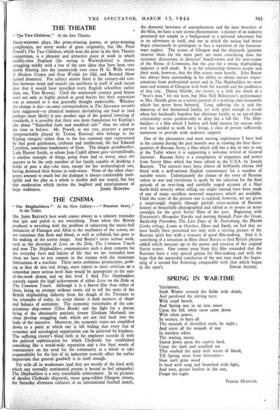THE THEATRE
PRIZE-WINNING plays, like prize-winning poems, or prize-winning symphonies, are never works of great originality, but Mr. Peter Powell's The Two Children, which won the prize in the Arts Theatre competition, is a pleasant and attractive piece of work in which middle-class England (the setting is Warwickshire) is shown struggling mildly with a few of the new ideas that have been very slowly filtering into the countryside ever since H. G. Wells wrote A Modern Utopia and New Worlds for Old, and Bernard Shaw turned dramatist. For subject matter there is the century-old con- flict between mind and muscle (an antithesis in itself of such recent date that it would have mystified every English schoolboy earlier than, say, Tom Brown). Until the nineteenth century good brains were not only as highly prized as good bodies but their separation was as unusual as it was generally thought undesirable. Whether the change is due—as some correspondents in The Spectator recently have suggested—to chemical manures devitalising our food or (and perhaps more likely) is just another sign of the general lowering of standards, it is possible that there was more foundation for Kipling's jibe about "flannelled fools and muddied oafs" than we cared at the time to believe. Mr. Powell, at any rate, presents a parson (irreproachably played by Tristan Rawson) who belongs to the Kipling category rather than to the less common type represented by that great gentleman, cricketer and intellectual, the late Edward Lyttelton, sometime headmaster of Eton. The dragon grandmother, Lady Harriet Smith, to whom Jean Cadell almost gave verisimilitude, is another example of things going from bad to worse, since she appears to be the only member of her family capable of drinking a bottle of port a day—the men, except for her archaeological son, having drowned their brains in soda-water. None of the other char- acters amount to much but the dialogue is always comfortably intel- ligible and the play as a whole is neither dull nor stupid, but has -that moderation which invites the laughter and entertainment of


























 Previous page
Previous page